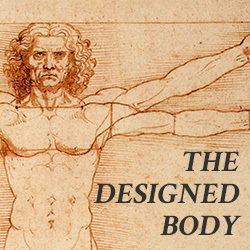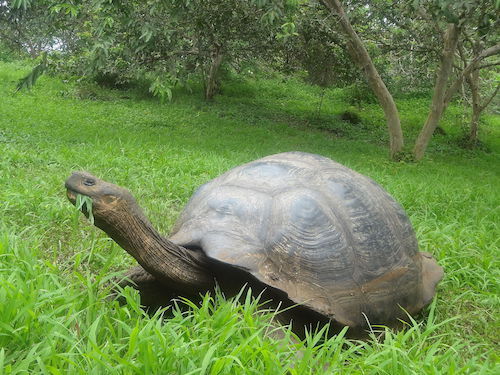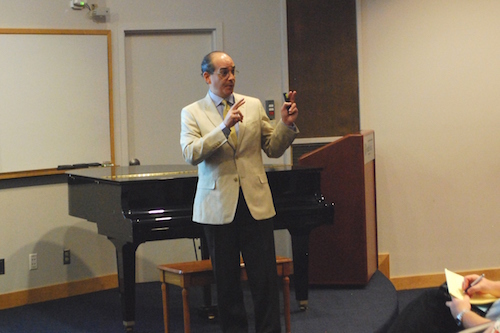Discovery Institute's Blog, page 80
March 31, 2016
What Has a Volcano Done for You Lately?
Volcanoes are common in the solar system. Remnants of ancient lava flows are plentiful on Mercury and Venus. Our moon has large "seas" (maria) of solidified lava. Mars has the largest extinct volcano known in the solar system, Olympus Mons -- a single volcano as big across as Arizona. Beyond Jupiter, evidence of cryovolcanic activity has been detected on some of Saturn's icy satellites, especially Enceladus, which erupts salty ice water out of over 100 fissures at its south pole. Saturn's Ti...
March 30, 2016
Thermoregulation and Thyroid Control: A Beautifully Irreducible System

Editor's note: Physicians have a special place among the thinkers who have elaborated the argument for intelligent design. Perhaps that's because, more than evolutionary biologists, they are familiar with the challenges of maintaining a functioning complex system, the human body. With that in mind, Evolution News is delighted to offer this series, "The Designed Body." For the complete series, see here. Dr. Glicksman practices palliative medicine for a hospice organization.
 Previously in this...
Previously in this...
Randomness in Natural Selection and Species as Islands in a "Vast Sea of Conceivable Arrangements"

Editor's note : Dr. Lnnig is a retired geneticist at the Max Planck Institute for Plant Breeding Research in Germany.
Stephen Meyer and Richard Dawkins have been engaged in a disagreement on randomness in natural selection. How shall we adjudicate it? First, I wrote in an encyclopedia article several years ago on "The Reproductive Powers of Living Beings and the Survival of the Fittest"1:
Dobzhansky's 1937 work Genetics and the Origin of Species is generally viewed as the crystallization poin...
March 29, 2016
Safe Science NOT Practiced Here: Don't Miss the April 7 Deadline for Summer Seminar Applications

In academic science settings, most thinking about evolution is done with a view to personal safety. What you don't want to do is come up with results that could fall into the hands of the "creationists" and give encouragement to anyone who is open to recognizing evidence of design in nature. Even worse, if you're a professor, you don't want to be seen as communicating ideas like that to your students.
In the current environment on campuses, a rare outpost of unsafe science is our Summer Semi...
Evolution as a Moral Metaphor
This from Jerry Coyne's Why Evolution Is True is just perfect. Over the weekend I was trying to explain to my daughter Naomi what distinguishes conservatism as a philosophical outlook from other perspectives. I said it has to do with the attitude you take to the dead. Do generations that came before have anything to teach us? Were they wiser, more in touch with certain truths about the universe, than we are?
Conservatives say yes, very possibly so. In that case, conserving the heritage they...
Merging Natural Selection with Learning Theory Yields a New and Improved Evolution; or Does It?

Perhaps we could call it neo-neo-Darwinism. As Brendan Dixon noted here yesterday, New Scientist promises that a "radical new addition to the theory of evolution" will fill in some gaps in the hoary old theory "while turning theories of intelligent design on their head." Who would want an upside-down theory, even if it were intuitively compelling?
A feather isn't just pretty: it's pretty useful. Strong, light and flexible, with tiny barbs to zip each filament to its neighbours, it is fantast...
March 28, 2016
An Idea and Its Impact: Human Origins and Human Ethos

Darwinian advocates today adopt a winsome mask of liberalism. However, evolutionary theory has a dark history of justifying racism and genocide.
In a lecture on the social consequences of ideas about human origins, Discovery Institute's John West reminds us that such thinking naturally impacts our culture's ethos, the way we evaluate human dignity, purpose, and equality, which in turn can't help but affect the way people treat each other.
This episode of ID the Future is Part 2 in a series...
Nature "Learns" to Create Complexity? Think Again

Editor's note: Evolution News is delighted to welcome Brendan Dixon as a new contributor. He is a software architect who joined Biologic Institute in 2006 to design and build the software for the Stylus project. He has worked for Microsoft, IBM, and Apple.
An article in the print edition of New Scientist is titled provocatively: "Intelligent design without a designer." It acknowledges "evolution's incredible prowess as a designer," and asks:
For centuries, the apparent perfection of [nature'...
Long-Term Trends in the Fossil Record

Editor's note: In his new book Evolution: Still a Theory in Crisis, Michael Denton not only updates the argument from his groundbreaking Evolution: A Theory in Crisis (1985) but also presents a powerful new critique of Darwinian evolution. This article is one in a series in which Dr. Denton summarizes some of the most important points of the new book. For the full story, get your copy of Evolution: Still a Theory in Crisis. For a limited time, you'll enjoy a 30 percent discount at CreateSpac...
March 27, 2016
The Common Sense Law of Physics

While the first formulations of the second law of thermodynamics were all about heat, about thermal entropy, many general physics texts generalize the second law beyond thermodynamics, with statements such as "In an isolated system, the direction of spontaneous change is from order to disorder" (Classical and Modern Physics, Kenneth Ford, 1973), and give examples of irreversible "entropy" increases that have nothing to do with thermal entropy, such as tornados turning towns into rubble, expl...
Discovery Institute's Blog
- Discovery Institute's profile
- 15 followers




